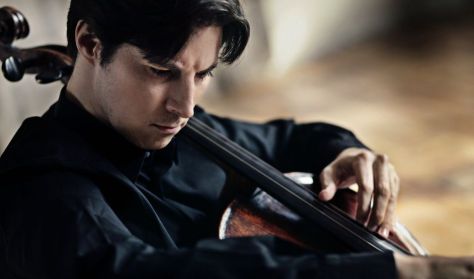
Orchestral concert: Brahms, Tchaikovsky, Debussy
Program:
Johannes Brahms: Tragic Overture, Op. 81
Pyotr Tchaikovsky: Variations on a Rococo Theme, Op. 33
Claude Debussy: Images for Orchestra

Program:
Johannes Brahms: Tragic Overture, Op. 81
Pyotr Tchaikovsky: Variations on a Rococo Theme, Op. 33
Claude Debussy: Images for Orchestra
Ön egy múltbeli eseményre keresett rá. Kérjük, válogasson aktuális kínálatunkból a Jegy.hu keresőjében!
Last event date: Sunday, April 03 2022 3:30PM
Orchestral concert: Brahms, Tchaikovsky, Debussy
Michel Tabachnik returns to BFO with German, Russian and French music. Similarly to his last two concerts in Budapest, this program of the Swiss conductor, who used to work together with Herbert von Karajan, again includes Debussy. This time, it will be Images for Orchestra, a tribute to the Baroque suite genre and also inspired by the composer’s love of Spanish music. The first part of the concert will feature the more solemn and “tragic” of Brahms’s pair of concert overtures, and then Tchaikovsky’s composition of Mozartian elegance, which could also be called a cello concerto. The evening’s protagonist will be a cello from 1727 and German artist Müller-Schott described in a review in The New York Times as a “fearless player with technique to burn”.
“One cries, the other laughs”. This was how Brahms briefly summarized the essence of his two overtures composed in 1880. He felt that together with the Academic Festival Overture incorporating merry student songs, he must also write a more solemn piece. He was not struck by any personal tragedy at that period; this is not program music and no specific event is linked to its composition (though a Faust theme is speculated by some). Nevertheless, the contrasting piece is characterized by a genuine dramatic tone. The D-minor key conjuring up the character of Beethoven’s last symphony as well as Brahms’s own piano concerto, the solid orchestration, the prominence of the lower strings and the two heavy opening chords immediately create a melancholy atmosphere.
In the 19th century, composers and musicians created music in symbiosis. Soloists evaluated the work dedicated to them and recommended improvements, while in return, they made the piece a success. This was especially true in the case of Tchaikovsky, an admirer of Mozart, and his friend Wilhelm Fitzenhagen. The cellist felt so close to the composer’s Rococo Variations that he was involved in the creative process even more than usually: he changed the order of the variations and made deletions. This, however, did not affect the theme of the composition, the Mozartian grace of the variations or the extremely subtle orchestration.
Following Images, his two cycle pieces for piano, Debussy also composed three movements for orchestra entitled Images pour orchestre (Images for Orchestra). The movements were written with several years between them and reflect vastly different atmospheres. The Gigues composed between 1909 and 1912 has an English feel to it containing the tune of an English folk song entitled The Keel Row. The most famous part of the piece, Iberia, where a guitar and castanets are also used, itself has three movements: after the lively and uniquely pulsating “In the Streets and Byways”, come the “the intoxicating spell of Andalusian nights” entitled “The Fragrances of the Night”, which is followed by “The Morning of a Festival Day” depicting the town waking up. Images for Orchestra is closed by the nostalgic “Spring Rounds” built up from blocks of tone.
A Szépség és a Szörnyeteg a Disney egyik legsikeresebb, legelbűvölőbb meséje, az első olyan animációs film, amelyet Oscar-díjra jelöltek a Legjobb film kategóriájában, és öt Grammy-díjat is kapott.
A Kossuth-díjas Vidnyánszky Attila, a Nemzeti Színház igazgatója először rendez operettet, méghozzá a világ leghíresebbjét!
Megnyugtató, ha az ember szülei évtizedek után is békében, szeretetben élnek együtt. Szinte egyszerre lélegeznek, ismerik egymás minden mozdulatát, fel…
A legsikeresebb magyar rockopera monumentális országos koncertturnéja, sztárelőadókkal és elképesztő látvánnyal. A koncertsiker egyedülálló látvánnyal és technikai megoldásokkal került bemutatásra…
item(s) in basket
total:
Time limit has expired. Please, put item(s) in to basket again.